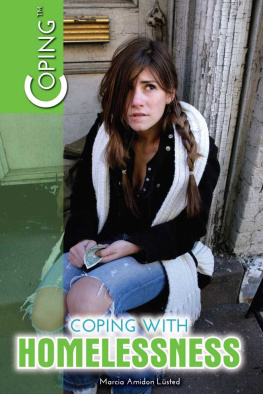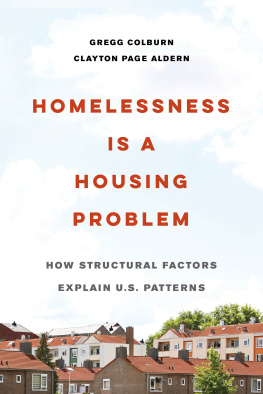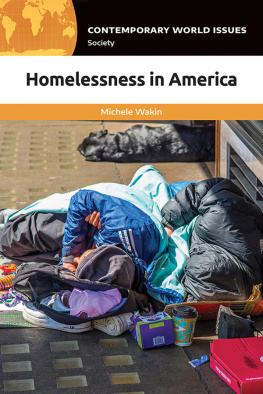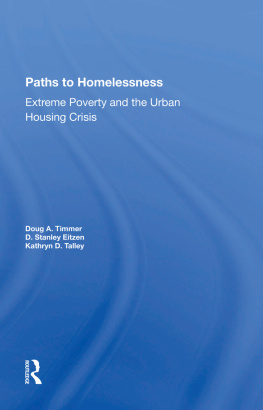COPING WITH HOMELESSNESS: ISSUES TO BE TACKLED AND BEST PRACTICES IN EUROPE
Coping with Homelessness: Issues to be Tackled and Best Practices in Europe
First published 1999 by Ashgate Publishing
Reissued 2018 by Routledge
2 Park Square, Milton Park, Abingdon, Oxon, OX14 4RN
711 Third Avenue, New York, NY 10017
Routledge is an imprint of the Taylor & Francis Group, an informa business
Copyright FEANTSA, ICCR, SFI, DST, STAKES, KIVOTOS 1999
All rights reserved. No part of this book may be reprinted or reproduced or utilised in any form or by any electronic, mechanical, or other means, now known or hereafter invented, including photocopying and recording, or in any information storage or retrieval system, without permission in writing from the publishers.
Notice:
Product or corporate names may be trademarks or registered trademarks, and are used only for identification and explanation without intent to infringe.
Publishers Note
The publisher has gone to great lengths to ensure the quality of this reprint but points out that some imperfections in the original copies may be apparent.
Disclaimer
The publisher has made every effort to trace copyright holders and welcomes correspondence from those they have been unable to contact.
A Library of Congress record exists under LC control number: 98046597
ISBN 13: 978-1-138-61187-0 (hbk)
ISBN 13: 978-1-138-61188-7 (pbk)
ISBN 13: 978-0-429-46356-3 (ebk)
Contents
Dragana Avramov
Serge Paugam
Katherine Duffy
Marc-Henry Soulet
Antonio Tosi
Antonio Tosi
Dragana Avramov
Sirkka-Liisa Krkkinen
Henk de Feijter
Angelika Kofler
Maryse Marpsat and Jean-Marie Firdion
Malcolm Williams
Martha R. Burt
Angelika Kofler
Mary Daly
Jan Vranken
Hans Kristensen
Sirkka-Liisa Krkkinen
Inger Koch-Nielsen
Marc-Henry Soulet
Inger Koch-Nielsen and Tobias Brner Stax
Volker Busch-Geertsema
Aristides Sapounakis
Preben Brandt
Sirkka-Liisa Krkkinen
Dragana Avramov
To enrich the experience of those who are working everyday to tackle homelessness, and to support the analysis of decision-makers, by means of academic research on a European scale. This was the ambition of FEANTSA the European Federation of National Organisations Working with the Homeless in proposing the EUROHOME research project to the European Commission (DG XII Science, Research and Development) in 1995 as part of the important Targeted Socio-Economic Research (TSER) Programme.
FEANTSA was able to draw upon the experience gained since 1991 through its work in running the European Observatory on Homelessness, which each year produces 15 national reports and one transnational report, with the participation of a network of research institutes across the 15 Member States and the valuable support of the European Commission (DG V Employment and Social Affairs). A group of five research institutes, already involved in the work of the Observatory, were brought together by FEANTSA to form the EUROHOME partnership: the Interdisciplinary Centre for Comparative Research in Social Sciences (ICCR) in Austria; the Danish National Institute of Social Research (SFI); the Department of Territorial Studies (DST) at Milan Polytechnic in Italy; the National Research and Development Centre for Welfare and Health (STAKES) in Finland; and the Kivotos Scientific Research Institute in Greece. Dr. Dragana Avramov who was then Coordinator of the Observatory was asked to supervise the scientific content of the EUROHOME project.
This publication Coping with Homelessness brings together the results of the work done by more than 20 experienced researchers over a period of two years. As a collection of separate articles, it does not presume to suggest that there is only one correct set of answers. The various contributions can only be considered to reflect the personal views of the individual authors concerned, and it is therefore understood that those who work with homeless people will not necessarily agree with all of the contents.
Leaving aside the debates about the definition of concepts and the causes of homelessness, and without being able to fully share all of the judgements made in relation to the evaluation of various practices, FEANTSA must surely endorse the central idea that solutions based solely on financial resources and social rights are inadequate unless there are also means of providing individuals with appropriate social support.
This collection of articles represents an important step forward in terms of our knowledge and understanding of homelessness. For this I would like to thank the Project Coordinator, Dragana Avramov, the members of the Editorial Board and all of the contributors, as well as the European Commission (DG XII) for entrusting FEANTSA and its academic partners to complete this ambitious research project.
Michel Mercadi
President of FEANTSA
In this preface I want to provide information about the set-up of the project under which this volume was produced and to set the stage for the reading of the book.
This volume presents the collected set of papers solicited under the project EUROHOME Emergency and Transitory Housing for Homeless People: Needs and Best Practices. The project brought together experts in the study of social protection, social exclusion, family and population sociology, housing and homelessness to review the body of knowledge in the field, analyse recent trends and discuss prospects for the improvement of the prevention and public response to housing exclusion in Europe. The project was organised around four major questions: What is known about homelessness? What are the key risk factors of social exclusion and homelessness? Are social services adequately dealing with the needs of homeless people? Can we identify models of good practice in integrated policies of social protection and complementary services for homeless people?
EUROHOME was funded by the European Commission, Directorate General XII, Science, Research and Development under the Targeted Socio-Economic Research programme, Area III Research Into Social Exclusion and Social Integration in Europe. The consortium which implemented the project was composed of four contractors and two associated contractors: The European Federation of National Organizations Working with the Homeless (FEANTSA) Brussels, Belgium (coordination); the Interdisciplinary Centre for Comparative Research in the Social Sciences (ICCR) Vienna, Austria; the Danish National Institute of Social Research (SFI), Copenhagen, Denmark; Polytechnic of Milan, Department of Territorial Sciences (DTS), Milan, Italy; the National Research and Development Centre for Welfare and Health (STAKES), Helsinki, Finland; the Research Institute Kivotos, Athens, Greece.








